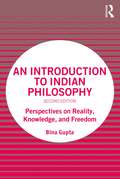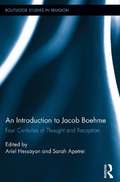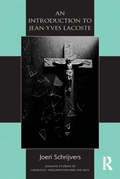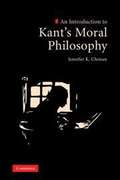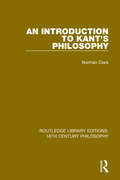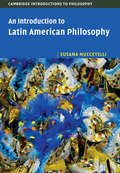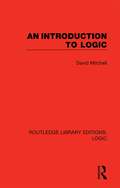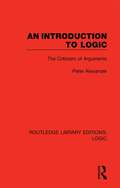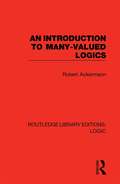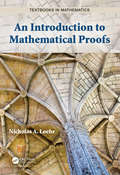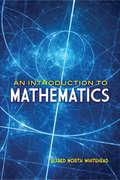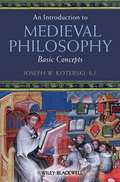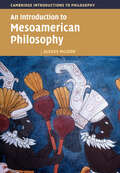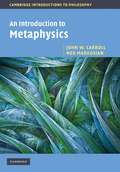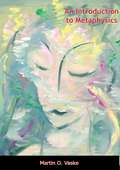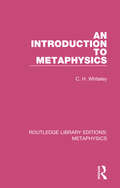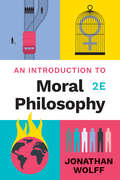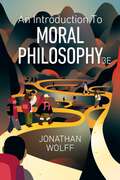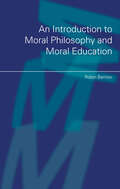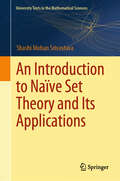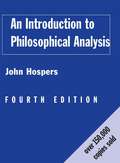- Table View
- List View
An Introduction to Indian Philosophy: Perspectives on Reality, Knowledge, and Freedom
by Bina GuptaAn Introduction to Indian Philosophy offers a profound yet accessible survey of the development of India’s philosophical tradition. Beginning with the formation of Brāhmaṇical, Jaina, Materialist, and Buddhist traditions, Bina Gupta guides the reader through the classical schools of Indian thought, culminating in a look at how these traditions inform Indian philosophy and society in modern times. Offering translations from source texts and clear explanations of philosophical terms, this text provides a rigorous overview of Indian philosophical contributions to epistemology, metaphysics, philosophy of language, and ethics. This is a must-read for anyone seeking a reliable and illuminating introduction to Indian philosophy. Key Updates in the Second Edition Reorganized into seven parts and fifteen chapters, making it easier for instructors to assign chapters for a semester-long course. Continues to introduce systems historically, but focuses on new key questions and issues within each system. Details new arguments, counter-arguments, objections, and their reformulations in the nine schools of Indian philosophy. Offers expanded discussion of how various schools of Indian philosophy are engaged with each other. Highlights key concepts and adds new grey boxes to explain selected key concepts. Includes a new section that problematizes the Western notion of "philosophy." New Suggested Readings sections are placed at the end of each chapter, which include recommended translations, a bibliography of important works, and pertinent recent scholarship for each school. Adds a new part (Part III) that explains the difficulties involved in translating from Sanskrit into English, discusses fundamental concepts and conceptual distinctions often used to present Indian philosophy to Western students, and reviews important features and maxims that most darśanas follow. Provides new examples of applications to illustrate more obscure concepts and principles.
An Introduction to Jacob Boehme: Four Centuries of Thought and Reception (Routledge Studies in Religion)
by Ariel Hessayon Sarah ApetreiThis volume brings together for the first time some of the world’s leading authorities on the German mystic Jacob Boehme, to illuminate his thought and its reception over four centuries for the benefit of students and advanced scholars alike. Boehme’s theosophical works have influenced Western culture in profound ways since their dissemination in the early 17th Century, and these interdisciplinary essays trace the social and cultural networks as well as the intellectual pathways involved in Boehme’s enduring impact. The chapters range from situating Boehme in the 16th Century Radical Reformation, to discussions of his significance in modern theology. They explore the major contexts for Boehme’s reception including the Pietist movement, Russian religious thought and Western esotericism, as well as focusing more closely on important readers: the religious radicals of the English Civil Wars and the later English Behmenists; literary figures such as Goethe and Blake, and great philosophers of the modern age, among them Schelling and Hegel. Together, the chapters illustrate the depth and variety of Boehme’s influence and a concluding chapter addresses directly an underlying theme of the volume – asking why Boehme matters today, and how readers in the present might be enriched by a fresh engagement with his apparently opaque and complex writings.
An Introduction to Jean-Yves Lacoste (Routledge Studies in Theology, Imagination and the Arts)
by Joeri SchrijversIntroducing the thought of philosopher and theologian Jean-Yves Lacoste, this book provides an overview spanning Lacoste's earliest works on sacramentality to his latest work Etre en Danger (2011) in which Lacoste opens up the liturgical experience onto a spiritual experience of life. Schrijvers unfolds the logic of what Lacoste calls 'the liturgical experience' from its violent variety in Expérience et Absolu to the logic of love and love's possibility as it is developed in the later works. Throughout the book, the focus is on Lacoste's dialogue with Heidegger and through this his attempt to widen the scope of phenomenology to include the phenomenality of the divine.
An Introduction to Kant'S Moral Philosophy
by Jennifer K. UlemanImmanuel Kant's moral philosophy is one of the most distinctive achievements of the European Enlightenment. At its heart lies what Kant called the 'strange thing': the free, rational, human will. This introduction explores the basis of Kant's anti-naturalist, secular, humanist vision of the human good. Moving from a sketch of the Kantian will, with all its component parts and attributes, to Kant's canonical arguments for his categorical imperative, this introduction shows why Kant thought his moral law the best summary expression of both his own philosophical work on morality and his readers' deepest shared convictions about the good. Kant's central tenets, key arguments, and core values are presented in an accessible and engaging way, making this book ideal for anyone eager to explore the fundamentals of Kant's moral philosophy.
An Introduction to Kant's Philosophy (Routledge Library Editions: 18th Century Philosophy #8)
by Norman ClarkEmmanuel Kant has the distinction of having introduced a great revolution into philosophy and yet stood the test of time. He stands as one of the great foundation stones of modern thought. This book, first published in 1925, covers Kant’s works essential to his philosophy as a system, and also illustrates his position in the history of thought. It is a clear and accurate statement of Kant’s chief doctrines.
An Introduction to Latin American Philosophy (Cambridge Introductions to Philosophy)
by Susana NuccetelliLatin American philosophy is best understood as a type of applied philosophy devoted to issues related to the culture and politics of Latin America. This introduction provides a comprehensive overview of its central topics. It explores not only the unique insights offered by Latin American thinkers into the traditional pre-established fields of Western philosophy, but also the many 'isms' developed as a direct result of Latin American thought. Many concern matters of practical ethics and social and political philosophy, such as Lascasianism, Arielism, Bolívarism, modest and immodest feminisms, republicanism, positivism, Marxism, and liberationism. But there are also meta-philosophical 'isms' such as originalism and perspectivism. Together with clear and accessible discussions of the major issues and arguments, the book offers helpful summaries, suggestions for further reading, and a glossary of terms. It will be valuable for all readers wanting to explore the richness and diversity of Latin American philosophy.
An Introduction to Logic (Routledge Library Editions: Logic)
by David MitchellOriginally published in 1967. The common aim of all logical enquiry is to discover and analyse correctly the forms of valid argument. In this book concise expositions of traditional, Aristotelian logic and of modern systems of propositional and predicative logic show how far that aim has been achieved.
An Introduction to Logic: The Criticism of Arguments (Routledge Library Editions: Logic)
by Peter AlexanderOriginally published in 1969. This book is for undergraduates whether specializing in philosophy or not. It assumes no previous knowledge of logic but aims to show how logical notions arise from, or are abstracted from, everyday discourse, whether technical or non-technical. It sets out a knowledge of principles and, while not historical, gives an account of the reasons for which modern systems have emerged from the traditional syllogistic logic, demonstrating how certain central ideas have developed. The text explains the connections between everyday reasoning and formal logic and works up to a brief sketch of systems of propositional calculus and predicate-calculus, using both the axiomatic method and the method of natural deduction. It provides a self-contained introduction but for those who intend to study the subject further it contains many suggestions and a sound basis for more advanced study.
An Introduction to Many-valued Logics (Routledge Library Editions: Logic)
by Robert AckermannOriginally published in 1967. An introduction to the literature of nonstandard logic, in particular to those nonstandard logics known as many-valued logics. Part I expounds and discusses implicational calculi, modal logics and many-valued logics and their associated calculi. Part II considers the detailed development of various many-valued calculi, and some of the important metathereoms which have been proved for them. Applications of the calculi to problems in the philosophy are also surveyed. This work combines criticism with exposition to form a comprehensive but concise survey of the field.
An Introduction to Mathematical Proofs (Textbooks in Mathematics)
by Nicholas A. LoehrAn Introduction to Mathematical Proofs presents fundamental material on logic, proof methods, set theory, number theory, relations, functions, cardinality, and the real number system. The text uses a methodical, detailed, and highly structured approach to proof techniques and related topics. No prerequisites are needed beyond high-school algebra. New material is presented in small chunks that are easy for beginners to digest. The author offers a friendly style without sacrificing mathematical rigor. Ideas are developed through motivating examples, precise definitions, carefully stated theorems, clear proofs, and a continual review of preceding topics. Features Study aids including section summaries and over 1100 exercises Careful coverage of individual proof-writing skills Proof annotations and structural outlines clarify tricky steps in proofs Thorough treatment of multiple quantifiers and their role in proofs Unified explanation of recursive definitions and induction proofs, with applications to greatest common divisors and prime factorizations About the Author: Nicholas A. Loehr is an associate professor of mathematics at Virginia Technical University. He has taught at College of William and Mary, United States Naval Academy, and University of Pennsylvania. He has won many teaching awards at three different schools. He has published over 50 journal articles. He also authored three other books for CRC Press, including Combinatorics, Second Edition, and Advanced Linear Algebra.
An Introduction to Mathematical Reasoning
by Peter J. EcclesThis book eases students into the rigors of university mathematics. The emphasis is on understanding and constructing proofs and writing clear mathematics. The author achieves this by exploring set theory, combinatorics, and number theory, topics that include many fundamental ideas and may not be a part of a young mathematician's toolkit. This material illustrates how familiar ideas can be formulated rigorously, provides examples demonstrating a wide range of basic methods of proof, and includes some of the all-time-great classic proofs. The book presents mathematics as a continually developing subject. Material meeting the needs of readers from a wide range of backgrounds is included. The over 250 problems include questions to interest and challenge the most able student but also plenty of routine exercises to help familiarize the reader with the basic ideas.
An Introduction to Mathematics (Dover Books on Mathematics)
by Alfred North Whitehead"The object of the following chapters is not to teach mathematics, but to enable students from the very beginning of their course to know what the science is about, and why it is necessarily the foundation of exact thought as applied to natural phenomena." Thus begins this volume by the prominent English philosopher and mathematician Alfred North Whitehead, a concise statement on the nature and meaning of mathematics for the general student. Expertly written and abounding in insights, the book presents a lively exposition of mathematical concepts, the history of their development, and their applications to the physical world. Whitehead explains in broad terms what mathematics is about, what it does, and how mathematicians do it.Generations of readers who have stayed with the philosopher from the beginning to the end have found themselves amply rewarded for taking this journey.
An Introduction to Medieval Philosophy: Basic Concepts
by Joseph W. KoterskiBy exploring the philosophical character of some of the greatest medieval thinkers, An Introduction to Medieval Philosophy provides a rich overview of philosophy in the world of Latin Christianity. Explores the deeply philosophical character of such medieval thinkers as Augustine, Boethius, Eriugena, Anselm, Aquinas, Bonaventure, Scotus, and Ockham Reviews the central features of the epistemological and metaphysical problem of universals Shows how medieval authors adapted philosophical ideas from antiquity to apply to their religious commitments Takes a broad philosophical approach of the medieval era by,taking account of classical metaphysics, general culture, and religious themes
An Introduction to Mesoamerican Philosophy (Cambridge Introductions to Philosophy)
by Alexus McLeodThe philosophy of Mesoamerica – the indigenous groups of precolonial North-Central America – is rich and varied but relatively little-known. In this ground-breaking book, Alexus McLeod introduces the philosophical traditions of the Maya, Nahua (Aztecs), Mixtecs, Zapotecs, and others, focussing in particular on their treatment of language, truth, time, creation, personhood, knowledge, and morality. His wide-ranging discussion includes important texts of world literature such as the K'iche Maya Popol Vuh and the Aztec Florentine Codex, as well as precolonial glyphic texts and imagery. This comprehensive and accessible book will give students, specialists and other interested readers an understanding of Mesoamerican philosophy and a sense of the current scholarship in the field.
An Introduction to Metametaphysics
by Tuomas E. TahkoHow do we come to know metaphysical truths? How does metaphysical inquiry work? Are metaphysical debates substantial? These are the questions which characterize metametaphysics. This book, the first systematic student introduction dedicated to metametaphysics, discusses the nature of metaphysics - its methodology, epistemology, ontology and our access to metaphysical knowledge. It provides students with a firm grounding in the basics of metametaphysics, covering a broad range of topics in metaontology such as existence, quantification, ontological commitment and ontological realism. Contemporary views are discussed along with those of Quine, Carnap and Meinong. Going beyond the metaontological debate, thorough treatment is given to novel topics in metametaphysics, including grounding, ontological dependence, fundamentality, modal epistemology, intuitions, thought experiments and the relationship between metaphysics and science. The book will be an essential resource for those studying advanced metaphysics, philosophical methodology, metametaphysics, epistemology and the philosophy of science.
An Introduction to Metaphilosophy
by Søren Overgaard Paul Gilbert Stephen Burwood Søren Overgaard Paul GilbertWhat is philosophy? How should we do it? Why should we bother to? These are the kinds of questions addressed by metaphilosophy – the philosophical study of the nature of philosophy itself. Students of philosophy today are faced with a confusing and daunting array of philosophical methods, approaches and styles and also deep divisions such as the notorious rift between analytic and Continental philosophy. This book takes readers through a full range of approaches – analytic versus Continental, scientistic versus humanistic, 'pure' versus applied – enabling them to locate and understand these different ways of doing philosophy. Clearly and accessibly written, it will stimulate reflection on philosophical practice and will be invaluable for students of philosophy and other philosophically inclined readers.
An Introduction to Metaphysics
by John W. Carroll Ned MarkosianThis book is an accessible introduction to the central themes of contemporary metaphysics. It carefully considers accounts of causation, freedom and determinism, laws of nature, personal identity, mental states, time, material objects, and properties, while inviting students to reflect on metaphysical problems. The philosophical questions discussed include: What makes it the case that one event causes another event? What are material objects? Given that material objects exist, do such things as properties exist? What makes it the case that a person may exist at two different times? An Introduction to Metaphysics makes these tough questions tractable by presenting the features and flaws of current attempts to answer them. Intended primarily for students taking a first class in metaphysics, this lucid and well-written text would also provide an excellent introduction for anyone interested in knowing more about this important area of philosophy.
An Introduction to Metaphysics
by Martin O. VaskeA clear, solid and succinct textbook in metaphysics, An Introduction to Metaphysics, which was first published in 1963, begins with a chapter on the existence of all things (including ourselves) and then proceeds to discuss the subjects of changing existents; participating, multiple existents; efficient causes; final and exemplary causes; the Primary Cause; the transcendental properties; categories of limited being; and the analogy of being.
An Introduction to Metaphysics (Routledge Library Editions: Metaphysics #10)
by C. H. WhiteleyOriginally published in 1950. For those interested in the fundamental problems of philosophy but not familiar with its technicalities, this book introduces the main type of theory in metaphysics, not by a catalogue of philosophers’ opinions but by a continuous train of reasoning. The central theme is the problem of the relation between Mind and Matter, and in the course of the argument there are discussions of mechanistic materialism, of idealism and our knowledge of the external world, and of the arguments for the existence of God. The problems are presented lucidly but without over-simplification.
An Introduction to Moral Philosophy (Second Edition)
by Jonathan WolffThe most contemporary and applicable introduction to moral philosophy From respected philosopher and writer Jonathan Wolff, this brief introduction to ethics stimulates independent thought, emphasizes real-world examples, and provides clear and engaging introductions to key moral theories and the thinkers behind them. The new Second Edition offers expanded coverage of moral reasoning, as well as two thoughtful and contemporary new chapters on applying moral philosophy and the ethics of race. A companion primary source collection, Readings in Moral Philosophy, amplifies issues discussed in the text, connecting them to problems in applied ethics.
An Introduction to Moral Philosophy (Third Edition)
by Jonathan WolffEmpower students to think critically about ethical theories and moral dilemmas. From his influential scholarship to his popular writings to his appearances on the BBC, Jonathan Wolff has a knack for making moral philosophy vivid and exciting for any audience. In An Introduction to Moral Philosophy, he wields this talent to deliver a text that students enjoy reading. In addition to surveying the basics of ethical theory and critical thinking, Wolff guides students through debates about some of today’s most urgent moral issues, including the ethics of race, gender, artificial intelligence, and public health. The text invites students to think for themselves about real-world issues and provides them with an accurate, appealing sense of what moral philosophy is all about. This purchase offers access to the digital ebook only.
An Introduction to Moral Philosophy and Moral Education
by Robin BarrowThis book presents and argues for a moral theory which draws on most of the major theoretical positions to some degree, but it also spells out the limits and boundaries of a moral theory. In doing so, it exposes a number of common confusions and misunderstandings about morality, and presents a strong argument for some indisputable truths in relation to the moral sphere. Divided into four parts, the book covers the key issues within moral philosophy: part one provides a lucid and powerful account of the nature and limits of moral theory, sharply distinguishing it from religion part two outlines a positive moral theory by exploring the defining principles of morality and the reasons for being moral part three distinguishes moral values from others such as ecological, health and safety and sexual values part four is concerned with the implications of our moral understanding for moral education. While this book concentrates on argument and ideas, a commentary to each chapter provides historical context and contemporary reference points. It will prove an invaluable resource for students of both Education and Philosophy.
An Introduction to Naïve Set Theory and Its Applications (University Texts in the Mathematical Sciences)
by Shashi Mohan SrivastavaPrimarily designed for graduate students of mathematics, this textbook delves into Naïve set theory, offering valuable insights for senior undergraduate students and researchers specializing in set theory. Commencing with a comprehensive exploration of functions and relations, the book extends its coverage to various applications of Naïve set theory across multiple mathematical branches, including real analysis, linear and abstract algebra, general topology, and introductory aspects of complex analysis and measure theory. The text meticulously introduces cardinal and ordinal numbers, along with transfinite induction, following the natural progression discovered by Cantor during his examination of trigonometric series. While this book provides a solid foundation, students intrigued by set theory for its intrinsic value should recognize that the subject extends far beyond the scope of this text.
An Introduction to Non-Classical Logic
by Graham PriestThis revised and considerably expanded 2nd edition, published in 2008, brings together a wide range of topics, including modal, tense, conditional, intuitionist, many-valued, paraconsistent, relevant, and fuzzy logics. Part 1, on propositional logic, is the old Introduction, but contains much new material. Part 2 is entirely new, and covers quantification and identity for all the logics in Part 1. The material is unified by the underlying theme of world semantics. All of the topics are explained clearly using devices such as tableau proofs, and their relation to current philosophical issues and debates are discussed. Students with a basic understanding of classical logic will find this book an invaluable introduction to an area that has become of central importance in both logic and philosophy. It will also interest people working in mathematics and computer science who wish to know about the area.
An Introduction to Philosophical Analysis
by John HospersJohn Hospers' Introduction to Philosophical Analysis has sold over 150,000 copies since its first publication. This new edition ensures that its success will continue into the twenty-first century. It remains the most accessible and authoritative introduction to philosophy available using the full power of the problem-based approach to the area to ensure that philosophy is not simply taught to students but practised by them.The most significant change to this edition is to respond to criticisms regarding the omission in the third edition of the famous opening chapter. A brand new chapter, Words and the World, replaces this in the fourth edition - which now features a large number of examples and illustrative dialogues. The rest of the text has been thoroughly revised and updated to take account of recent developments in some areas of philosophy.
